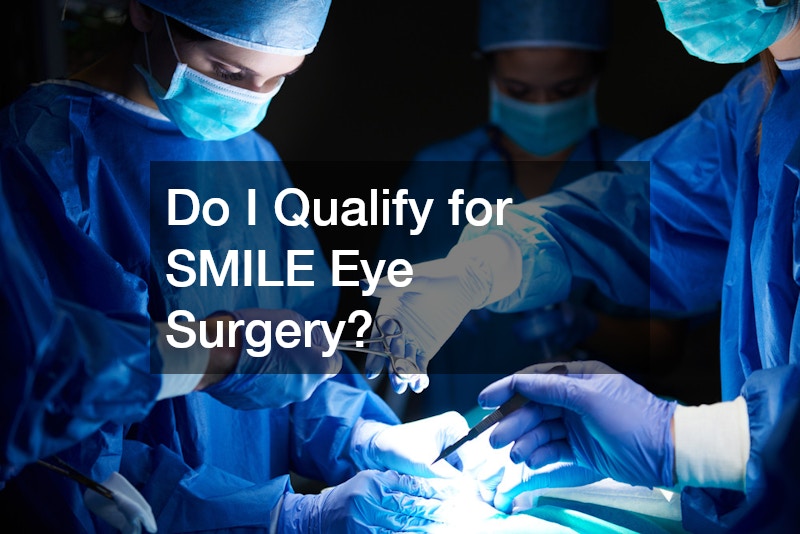In the realm of vision correction, advancements in technology have paved the way for innovative procedures like SMILE (Small Incision Lenticule Extraction) eye surgery. This minimally invasive technique offers an alternative to traditional LASIK, promising a quick recovery and less discomfort. If you’re considering SMILE, understanding the qualification criteria is crucial. Here’s a comprehensive guide to help you determine if you are a suitable candidate for this cutting-edge procedure.
What Is SMILE Eye Surgery?
SMILE eye surgery is a refractive surgery designed to correct myopia (nearsightedness) and astigmatism. Unlike LASIK, which involves creating a flap in the cornea, SMILE uses a femtosecond laser to create a small lenticule within the cornea, which is then removed through a tiny incision. This technique preserves more of the cornea’s natural structure, potentially reducing the risk of complications and dry eye syndrome.
General Eligibility Criteria
To determine if you qualify for SMILE eye surgery, eye surgeons typically evaluate several factors, including:
- Age: Candidates should be at least 22 years old. This ensures that their vision has stabilized, reducing the likelihood of significant post-surgery changes.
- Stable Vision: You should have a stable prescription for at least 12 months. Significant changes in your prescription could indicate that your vision is not yet stable, which is crucial for successful surgery outcomes.
- Refractive Error: SMILE is primarily used to correct myopia and astigmatism. Ideal candidates usually have a myopic prescription ranging from -1.00 to -10.00 diopters and astigmatism up to 3.00 diopters.
- Corneal Health: A thorough evaluation of your cornea’s shape and thickness is essential. SMILE requires a certain corneal thickness to ensure safety and effectiveness. Individuals with thin corneas or irregularities may not qualify.
- Overall Eye Health: Candidates must have healthy eyes, free from diseases such as keratoconus, glaucoma, or severe dry eyes. These conditions can complicate the procedure and affect healing.
- General Health: Certain systemic conditions, such as uncontrolled diabetes or autoimmune diseases, can impact healing and the success of the surgery. Your overall health is an important consideration.
Specific Considerations
While the general criteria provide a broad overview, there are specific considerations that your eye surgeon will assess:
- Corneal Shape and Thickness: Using advanced imaging techniques, your surgeon will measure the curvature and thickness of your cornea. SMILE requires a minimum corneal thickness to ensure there is enough tissue to safely remove the lenticule.
- Pupil Size: Larger pupils can increase the risk of post-surgery visual disturbances, such as halos or glare, especially in low-light conditions. Your surgeon will evaluate your pupil size under different lighting conditions.
- Tear Production: Adequate tear production is crucial for healing. Pre-existing dry eye conditions can be exacerbated by the surgery, so your tear film will be assessed.
- Previous Eye Surgeries: If you’ve had previous eye surgeries, it might affect your eligibility for SMILE. Certain prior procedures can alter the corneal structure, complicating the outcomes of SMILE.
Consultation and Evaluation
The journey to determine your eligibility for SMILE eye surgery begins with a comprehensive consultation and eye examination. Here’s what you can expect during this process:
- Medical History Review: Your surgeon will review your medical history, including any medications you are taking and any past or present eye conditions.
- Vision Assessment: A thorough vision test will determine your current prescription and evaluate any changes over time.
- Corneal Mapping: Advanced diagnostic tools, such as corneal topography and pachymetry, will map the surface of your cornea and measure its thickness.
- Pupil Dilation: Your pupils will be dilated to allow the surgeon to examine the internal structures of your eyes, ensuring there are no underlying issues that could impact surgery or recovery.
- Tear Film Evaluation: Your tear production and quality will be assessed to ensure you have a healthy tear film, which is critical for post-surgery healing.
Alternative Options
If you are not a candidate for SMILE eye surgery, there are alternative vision correction options available:
- LASIK: This popular procedure corrects vision by reshaping the cornea. It’s suitable for a broader range of prescriptions and corneal thicknesses.
- PRK (Photorefractive Keratectomy): PRK is another alternative that does not involve creating a corneal flap, making it suitable for individuals with thinner corneas.
- Implantable Collamer Lenses (ICL): For those with severe myopia or thin corneas, ICL involves implanting a lens inside the eye to correct vision.


